The 2021 Job Seeker Mindset
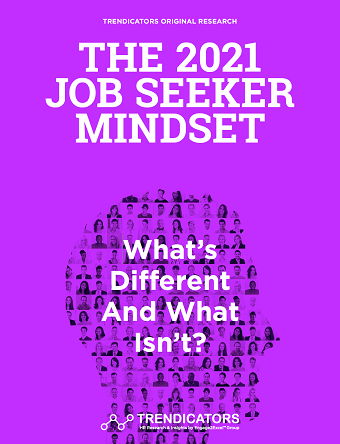
INTRODUCTION
Much has been written about the fundamental changes organizations have needed to make in their recruiting processes as a result of the COVID-19 pandemic. But how has the pandemic affected the perceptions and interests of active and passive job candidates? What causes candidates to accept or reject a job offer today? Why do employees consider searching for employment elsewhere? What do employees expect and what is most important to them in the recruiting process? And what role do recognition and onboarding experiences play in influencing employee career choices? The 2021 Job Seeker Mindset report provides detailed answers to these questions based on a nationwide survey of 803 active job seekers, 574 passive job seekers and 123 non-job seekers.
This marks the third edition of the job seeker survey report, which we started conducting every two years beginning in 2017. The Trendicators research division of Engage2Excel Group conducts this survey because we believe employers can’t effectively improve candidate experiences unless they have reliable research on what matters most to active and passive candidates. As our survey results show, the candidate experience is more important in 2021 than ever before.
The 2021 Job Seeker Mindset report is the result of research and analysis conducted by Engage2Excel Group’s chief scientific officer, Dr. Jack Wiley. Jack is well-known for his RESPECT framework, which focuses on what employees really want from their employer. The acronym RESPECT stands for Recognition, Exciting Work, Security, Pay, Education and Career Growth, Conditions and Truth. In his latest book, The Employee-Centric Manager, Dr. Wiley presents easy-to-follow guidance that will help any manager attract and retain employees; improve the productivity of the teams they manage; increase managerial effectiveness ratings; and earn promotions and higher pay.
Survey Demographics
Number of Respondents: 1,500
Countries Represented: United States
Industries Represented: All major industries
Respondent Demographics: US adult workers in all job types with proportionate representation of gender, age group and racial/ ethnic origin
Margin of Error: 95% confidence level +/- 1.5%
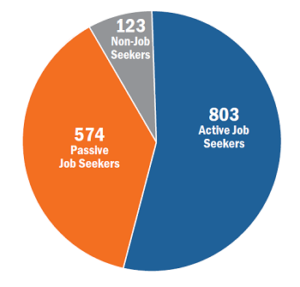
The results published in this report are based on a survey of 1,500 individuals, from all major industry sectors and demographic groups, including 803 active job seekers, 574 passive job seekers and 123 non-job seekers.
Trendicators is the research division of Engage2Excel Group, a leading provider of employee recruitment, recognition, and survey and analytics solutions. Trendicators provides original research, along with reports on insights and best practices from industry leaders and experts.
Download
 hbspt.cta.load(123973, '5d8d0768-0e13-4f0c-9843-08e532d928e4', {"region":"na1"});
hbspt.cta.load(123973, '5d8d0768-0e13-4f0c-9843-08e532d928e4', {"region":"na1"});
How Has COVID-19 Influenced Candidate Perceptions?
Our survey, conducted between May 25 and June 18, 2021, provides valuable insights into how job seekers’ perspectives have been affected by COVID-19. More than two-thirds of survey respondents (71%) are working from home because of the pandemic. Commenting on the recent spike in infections due to the Delta variant, CDC director Rochelle Walensky said, “This is becoming a pandemic of the unvaccinated.” The fact that 26% of job seekers indicated they would not accept a job that required them to get a COVID-19 vaccine is evidence that the pandemic is far from over in the U.S.
What’s Changed? One might think that during times of record unemployment, creating positive candidate experiences would become less important. A comparison of the 2019 Job Seeker survey results and the results of our recent survey during the pandemic reveals quite the opposite. The table on the following page shows a ranked comparison of the most significant changes in candidate perceptions.
The percentage of candidates who said that a personalized gift from an employer would influence their acceptance of a job offer increased 28 points to 64%. The percentage of respondents who stated that interacting with other employees before or after a job offer would impact their acceptance jumped by more than 20 points. All passive candidates today are willing to learn about a new job opportunity, and 41% of all respondents said reporting to a manager younger than they are would affect their acceptance decision. While the importance of meeting someone in management or in the same job role during the interview process has declined, recognition and onboarding experiences have become even more important.
What Matters Most? The big takeaway from our 2021 survey is this: the candidate experience is more important than ever in today’s job market. Candidates expect more from prospective employers than just a job offer. They want reassurance on several different levels that they are making the right career decision.

Download
 hbspt.cta.load(123973, '5d8d0768-0e13-4f0c-9843-08e532d928e4', {"region":"na1"});
hbspt.cta.load(123973, '5d8d0768-0e13-4f0c-9843-08e532d928e4', {"region":"na1"});
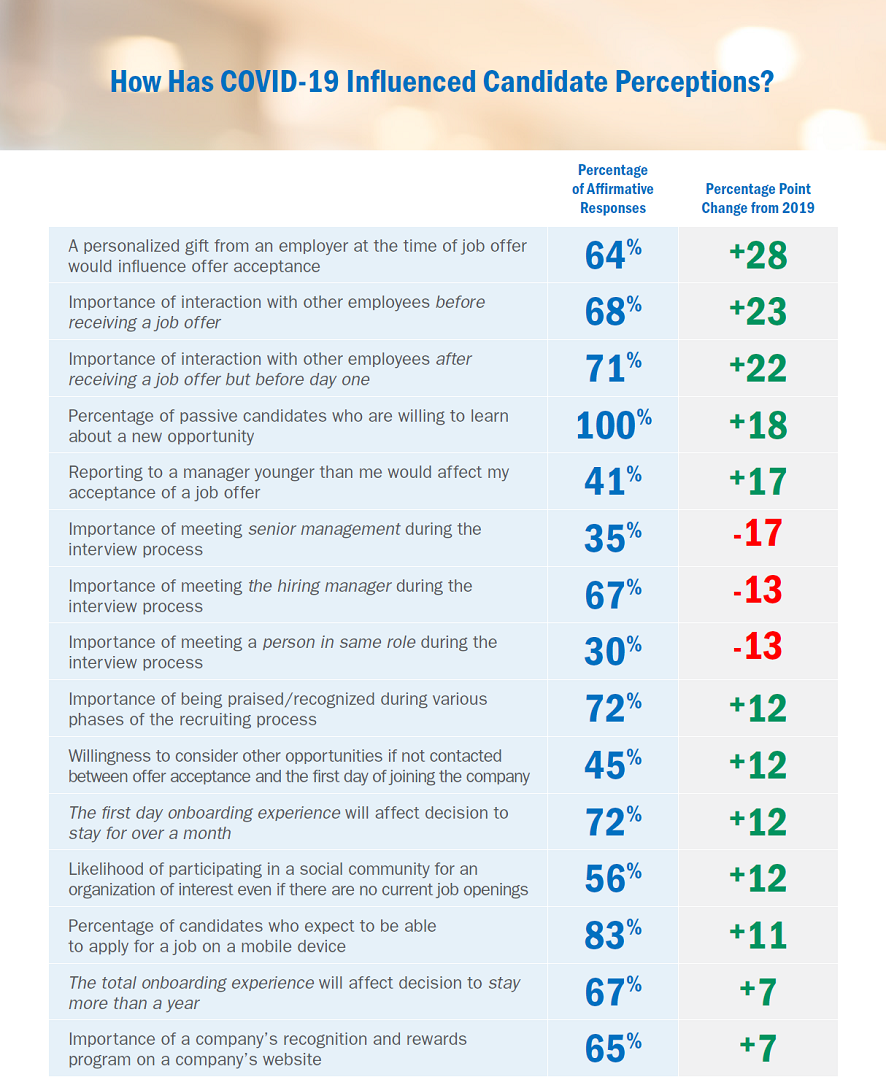
Download
 hbspt.cta.load(123973, '5d8d0768-0e13-4f0c-9843-08e532d928e4', {"region":"na1"});
hbspt.cta.load(123973, '5d8d0768-0e13-4f0c-9843-08e532d928e4', {"region":"na1"});
Why Do Candidates Accept or Reject Job Offers?
While the pandemic affected candidate perceptions in many ways, as reported in the previous section, the number one reason for accepting or rejecting a job offer hasn’t changed in four years. In 2017, 2019 and again in 2021, candidates said that being recognized, appreciated and shown respect during the recruitment process was the single most important variable in deciding whether to accept or reject a job offer.
The top three reasons for accepting a job offer haven’t changed from 2019, with compensation and job fit listed as the second and third most important factors. In 2017, compensation was listed as the third most important factor, with job fit in the second position. There was only one significant change in the top reasons for rejecting a job offer in 2021. Concern about job security and job fit tied for the third most important factor that would cause a candidate to turn down a job offer.
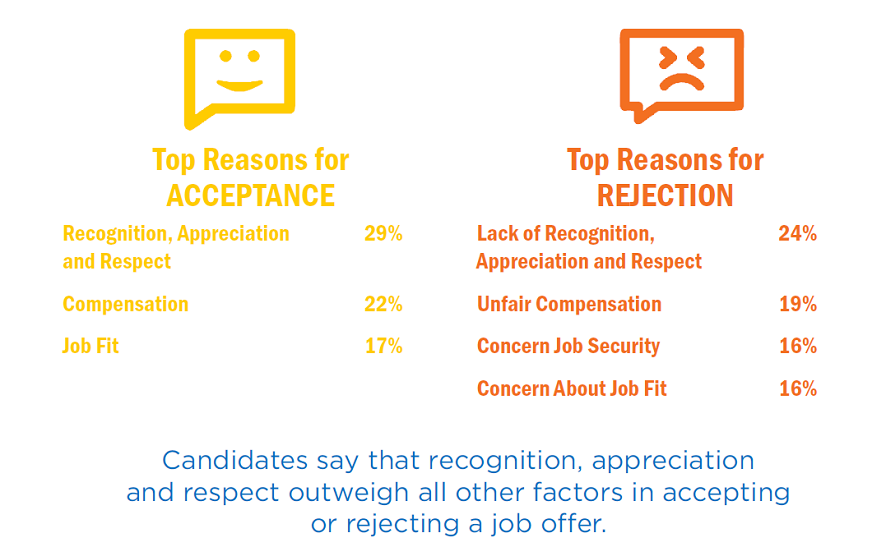
Download
 hbspt.cta.load(123973, '5d8d0768-0e13-4f0c-9843-08e532d928e4', {"region":"na1"});
hbspt.cta.load(123973, '5d8d0768-0e13-4f0c-9843-08e532d928e4', {"region":"na1"});
Why Do People Seek Employment Elsewhere?
CEOs and HR leaders who are concerned about employee retention need to make sure that they are paying fair wages, building a culture of recognition and respect, and communicating with employees to address concerns about job security. Compensation, which first rose to the top of the list in 2019, is still the top reason employees cited that would cause them to seek employment elsewhere. In our 2017 survey, employees said that lack of recognition, appreciation and respect was the most important factor that would cause them to leave an employer. This has remained the second most important influence on retention for the past two years. One can surmise that average wage increases in 2019 and 2021 were factors in keeping compensation as the top driver for voluntary turnover. Not surprisingly, concerns over job security in 2021 came in as the third most important reason employees gave that would cause them to look for another job.
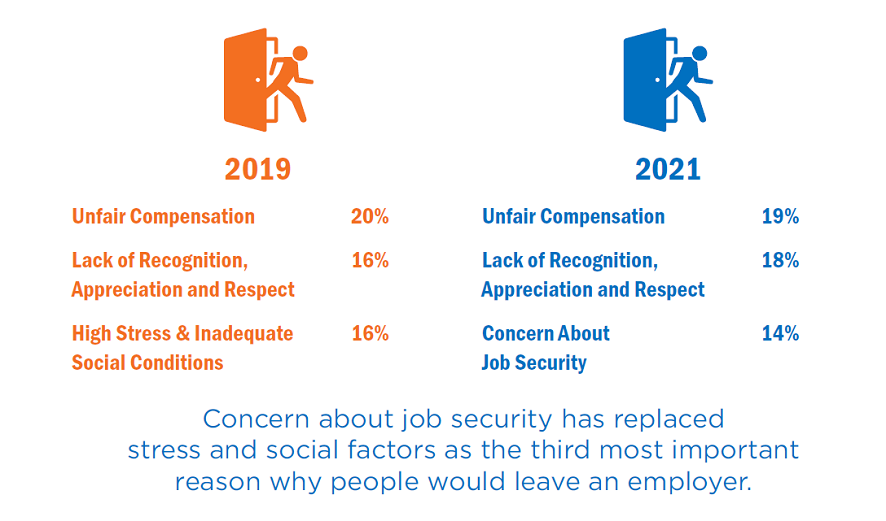
Download
 hbspt.cta.load(123973, '5d8d0768-0e13-4f0c-9843-08e532d928e4', {"region":"na1"});
hbspt.cta.load(123973, '5d8d0768-0e13-4f0c-9843-08e532d928e4', {"region":"na1"});
What Do Candidates Think about Recruiting Processes?
There are a few important changes in employee perceptions about the recruiting process when comparing 2021 results with our 2019 job seeker survey results. While email and phone remain the top two preferred means of communicating with recruiters, the percentage of those preferring to communicate via text message has increased from 10% to 18%.
The percentage of candidates who expect to apply for a job on a mobile device has risen from 72% to 83%. And 56% say they would participate in a social community for an organization they are interested in, even if there are no current job openings, an increase of 12 percentage points.
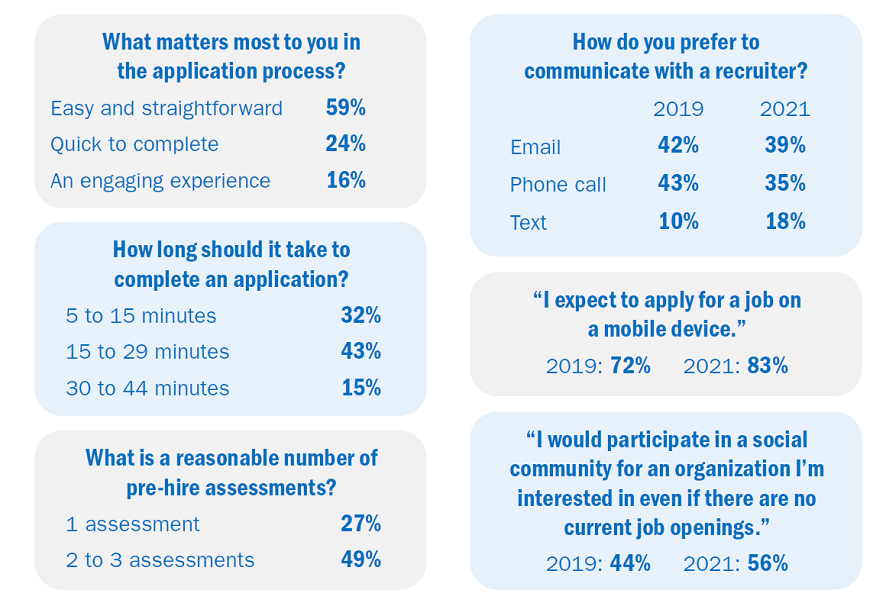
Download
 hbspt.cta.load(123973, '5d8d0768-0e13-4f0c-9843-08e532d928e4', {"region":"na1"});
hbspt.cta.load(123973, '5d8d0768-0e13-4f0c-9843-08e532d928e4', {"region":"na1"});
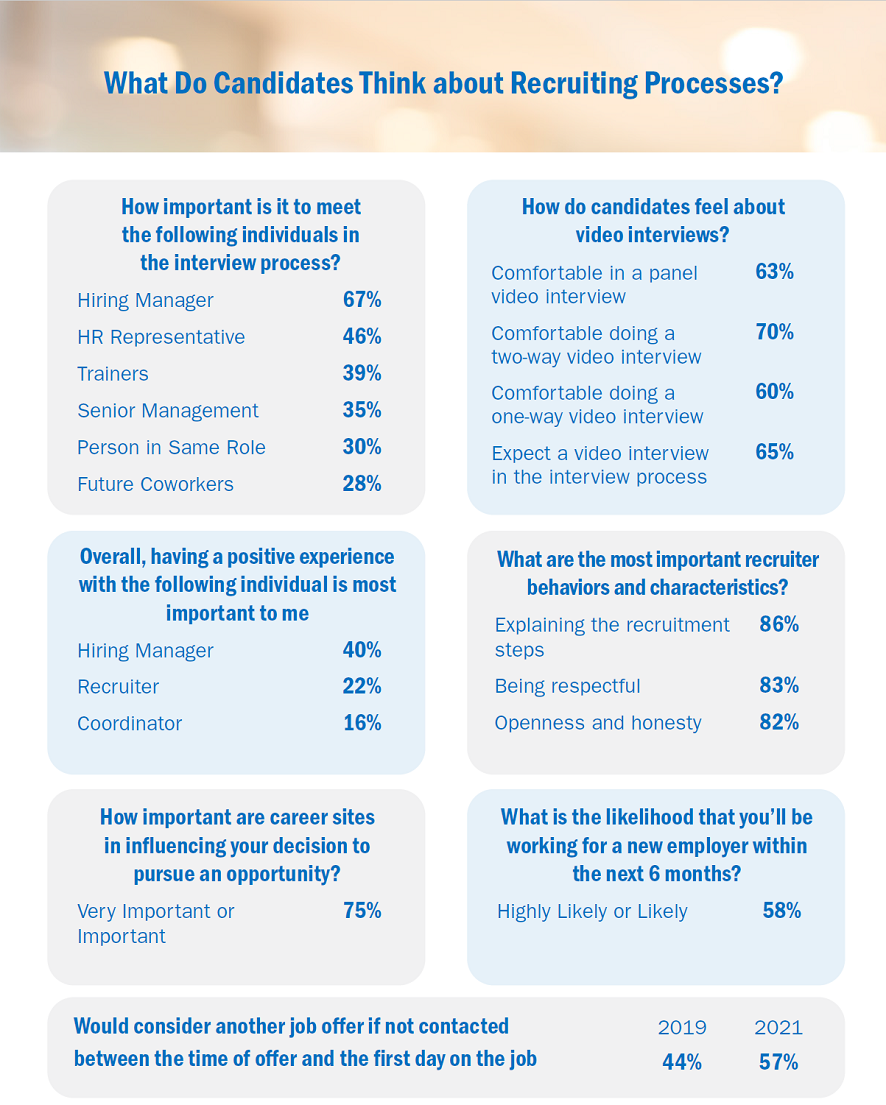
Download
 hbspt.cta.load(123973, '5d8d0768-0e13-4f0c-9843-08e532d928e4', {"region":"na1"});
hbspt.cta.load(123973, '5d8d0768-0e13-4f0c-9843-08e532d928e4', {"region":"na1"});
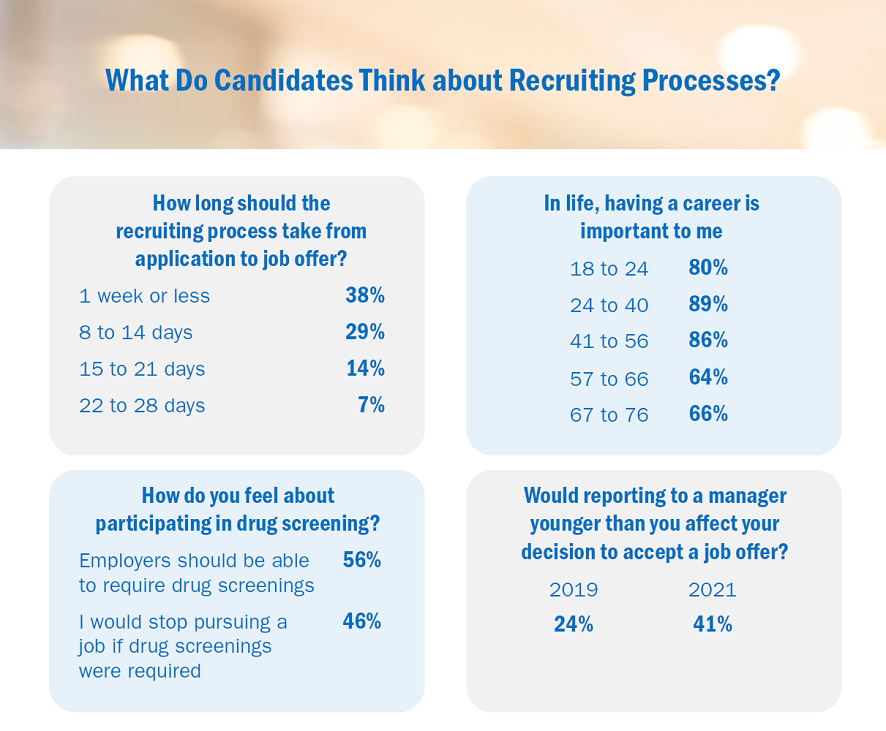
Candidates in 2021 are less concerned about meeting hiring managers, HR representatives and senior management during the recruiting process than they were in 2019, no doubt a result of the pandemic. Also, as a result of the pandemic, 65% of candidates now expect a video interview, up from 43% in 2019. Interestingly, in 2019 candidates said that a recruiter’s knowledge about the job role was third on their list of factors that kept them engaged. In 2021, this was replaced by an interest in better understanding the steps in an employer’s recruiting process.
More than half (57%) of candidates said they would consider another job offer if the employer did not contact them between the time of offer and their first day on the job, an increase of 13 percentage points over 2019. More than two-thirds (67%) of candidates expect the total time from applying for a job to receiving a job offer to be two weeks or less. A stark contrast of views exists about the use of drug screens, with 60% believing that employers should be able to require them and 46% who say they wouldn’t pursue an opportunity if drug screens were required. Finally, 41% of candidates say that reporting to a manager younger than them would affect their decision to accept a job offer, an increase of 17 percentage points over 2019.
Download
 hbspt.cta.load(123973, '5d8d0768-0e13-4f0c-9843-08e532d928e4', {"region":"na1"});
hbspt.cta.load(123973, '5d8d0768-0e13-4f0c-9843-08e532d928e4', {"region":"na1"});
How Important is Recognition in the Recruiting Process?
The importance of recognizing, appreciating a gift from the employer at the time of offer and respecting candidates cannot be would influence their acceptance of the offer underestimated. It is cited as the most —a 28 point increase. Further evidence of the important reason for accepting or rejecting importance of recognition is that more than a job offer, and 70% or more say that it is two-thirds (71%) of active job seekers say that important during and after all phases of the details about an employer’s recognition and recruiting process. The single greatest change rewards program on the company’s website over 2019 is that 64% now say that receiving are important to them.
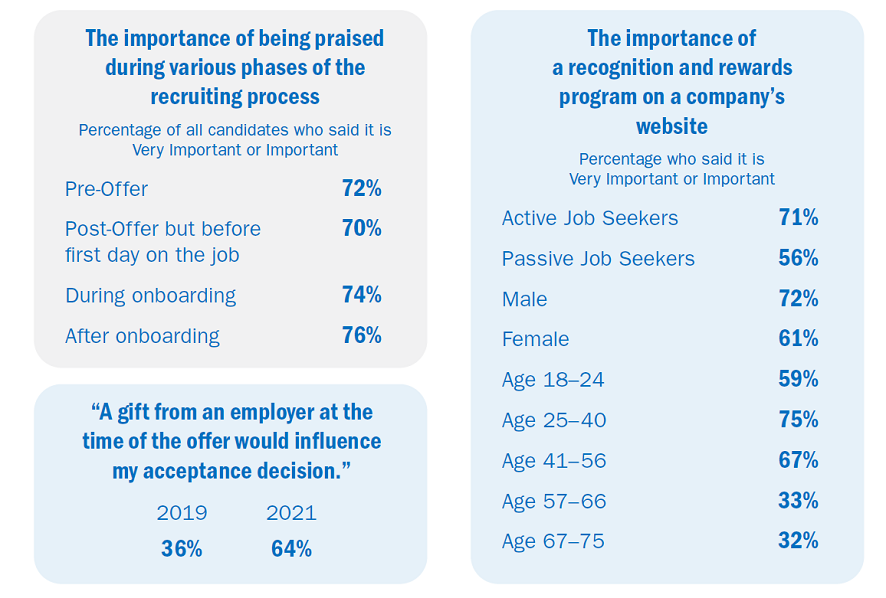
Download
 hbspt.cta.load(123973, '5d8d0768-0e13-4f0c-9843-08e532d928e4', {"region":"na1"});
hbspt.cta.load(123973, '5d8d0768-0e13-4f0c-9843-08e532d928e4', {"region":"na1"});
What Do Candidates Think about Onboarding Processes?
Candidates expect a well-planned onboarding experience. Nearly three-quarters (72%) said their first-day onboarding experience would affect their decision to stay more than a month, up 22 percentage points over 2019. More than two thirds said the total onboarding experience affects their decision to stay over a year. While interacting with other employees has always been important, a large percentage of candidates say this is important before their first day.
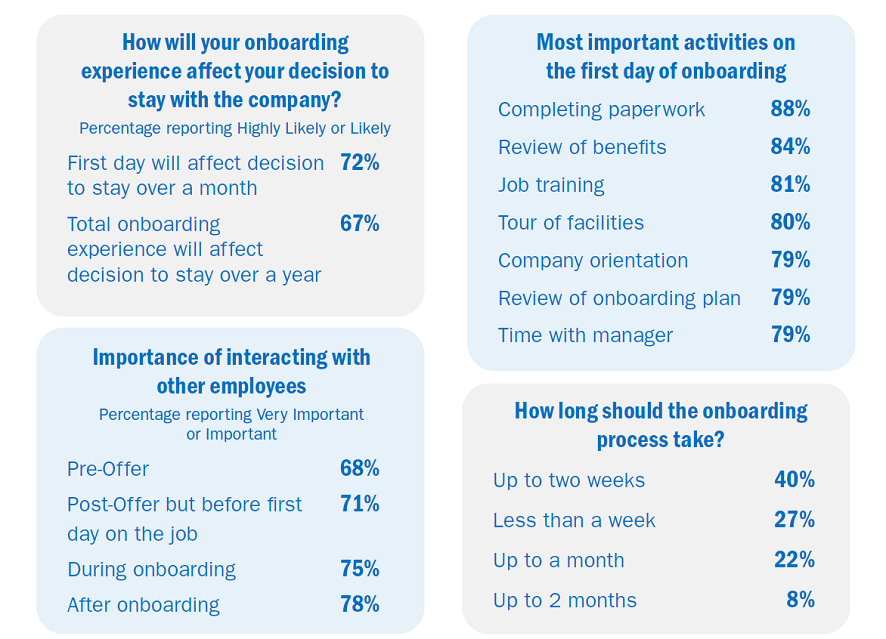
Download
 hbspt.cta.load(123973, '5d8d0768-0e13-4f0c-9843-08e532d928e4', {"region":"na1"});
hbspt.cta.load(123973, '5d8d0768-0e13-4f0c-9843-08e532d928e4', {"region":"na1"});
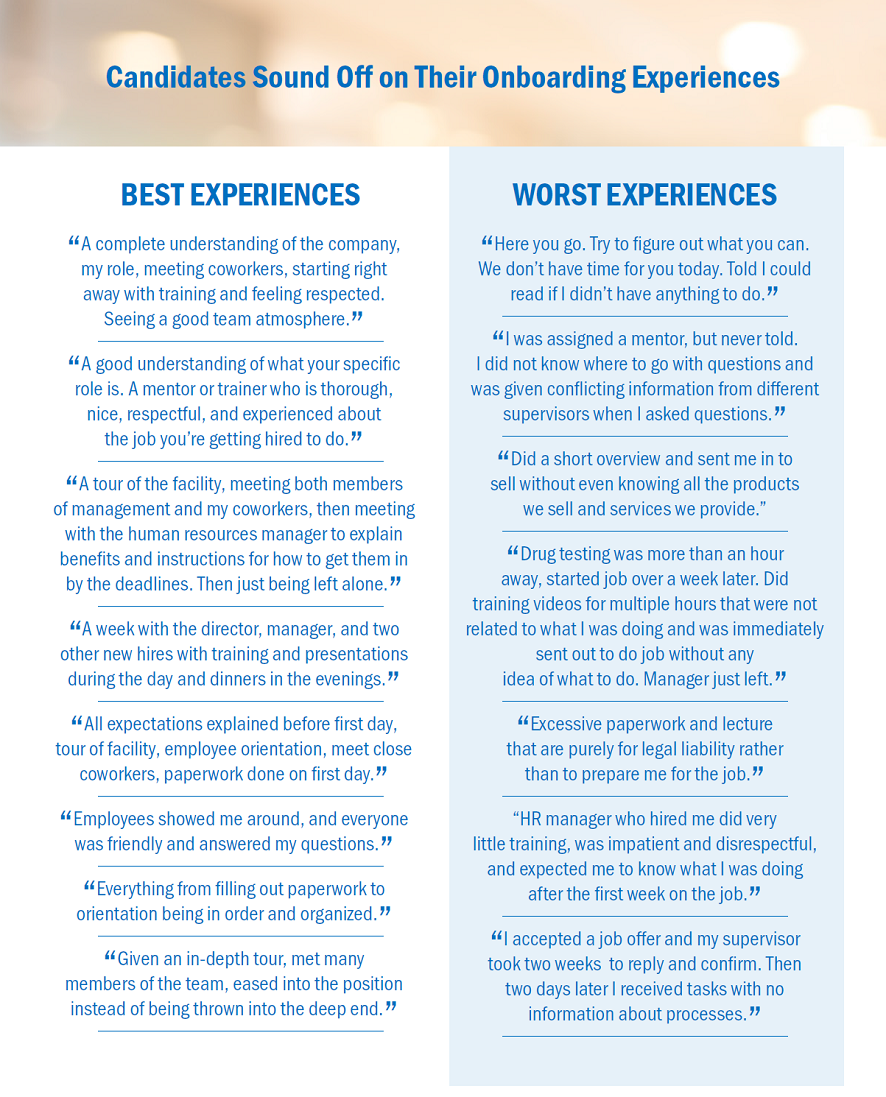
Download
 hbspt.cta.load(123973, '5d8d0768-0e13-4f0c-9843-08e532d928e4', {"region":"na1"});
hbspt.cta.load(123973, '5d8d0768-0e13-4f0c-9843-08e532d928e4', {"region":"na1"});
Use Insights from the 2021 Job Seeker Mindset Report to Optimize Recruiting and Onboarding Experiences
OPTIMIZE RECRUITING EXPERIENCES
Educate each member of your talent acquisition team about the importance of praising and recognizing positive behaviors among all candidates. For candidates, this experience is the single most important factor in accepting or rejecting a job offer. Consider hiring
undercover candidates to audit recruitment experiences annually.
Make sure your total compensation and benefits are competitive and clearly understood by employees and candidates. Conduct an annual employee survey to evaluate causes that may negatively influence employee engagement, productivity and loyalty.
Re-evaluate your recognition and rewards program periodically, actively promote this important benefit internally. Make sure that this program occupies a prominent place on your career site.
Review your company’s new employee communications program. Replace standardized form letters with engaging and personalized communications and consider sending branded gift items to make new hires feel welcome.
OPTIMIZE ONBOARDING EXPERIENCES
Carefully plan, organize and execute each employee’s onboarding experience to avoid creating a negative first impression. First-day onboarding experiences influence whether employees will stay over a month.
Formalize onboarding programs if you haven’t already and make sure to build in opportunities for recognition and employee interaction. In addition, set expectations about how long an onboarding program will last and what’s included.
Show your appreciation for a new recruit by celebrating their offer acceptance with a welcome gift branded with your company logo. It’s a great way to make new employees feel like they belong even before their first day.
Conduct a post-onboarding survey of every new employee and provide this feedback to everyone involved in the onboarding process.
Download
 hbspt.cta.load(123973, '5d8d0768-0e13-4f0c-9843-08e532d928e4', {"region":"na1"});
hbspt.cta.load(123973, '5d8d0768-0e13-4f0c-9843-08e532d928e4', {"region":"na1"});
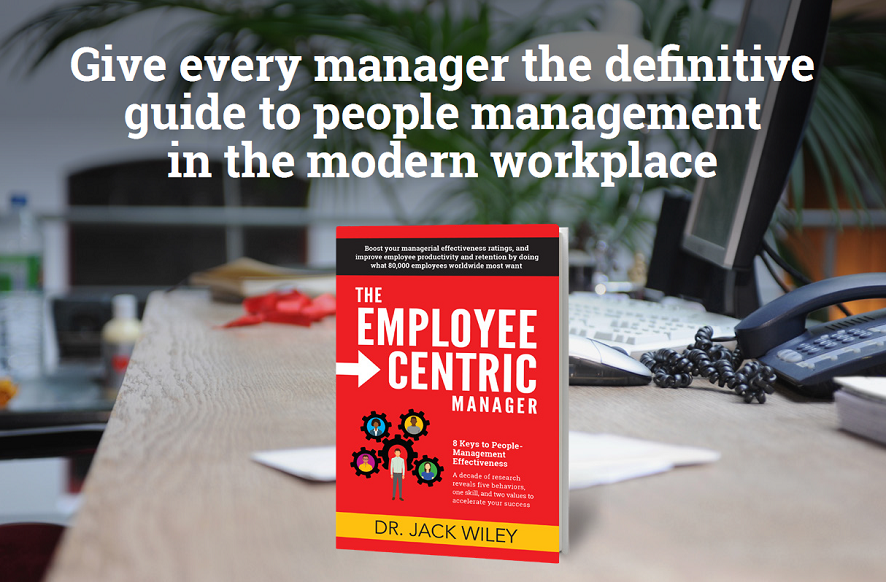
Engage2Excel is proud to announce the availability of a special, pre-release edition of The Employee-Centric Manager by Dr. Jack Wiley, our chief scientific officer. Based on a decade of groundbreaking research, this much-anticipated book is the definitive guide to people management in the modern workplace.
Special Offer: The Employee-Centric Manager is available for volume corporate purchases through Engage2Excel. You can purchase a gift-box edition to be sent to every manager with a personalized letter from your CEO or have your volume purchase of books shipped to one or more corporate addresses.
A Must-Read for every manager in your organization.
Based on a Decade of Research that reveals what 80,000 employees in 27 countries most want from their manager.
Written by Dr. Jack Wiley, award-winning organizational psychologist, researcher, author and leadership consultant.
8 Keys to Managerial Effectiveness: Presents the five behaviors, one skill and two values every manager can embrace immediately to boost managerial effectiveness ratings and improve employee productivity and retention.
Written for Managers of All Levels: Includes 90 easy-to-apply “do and don’t” tips, 40 best practice recommendations, eight successful manager profiles and 96 verbatim quotes from employees on their positive and negative experiences with managers.
Order online at Engage2Excel.com/ECM or call 704.872.5231 x2049
Download
 hbspt.cta.load(123973, '5d8d0768-0e13-4f0c-9843-08e532d928e4', {"region":"na1"});
hbspt.cta.load(123973, '5d8d0768-0e13-4f0c-9843-08e532d928e4', {"region":"na1"});